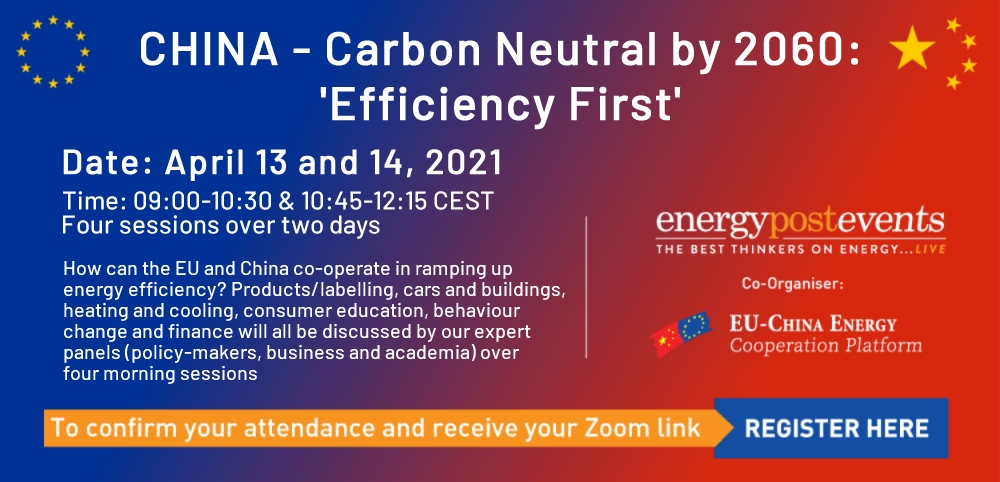
EU and China: Efficiency, the foundation for our net-zero future
Background
At this third 2-day online conference presented in association with ECECP (the EU China Energy Cooperation Platform) we will look at how Energy Efficiency measures can contribute to decarbonisation efforts both in the EU and in China. What are the opportunities, what should be the approach and how can we collaborate? A timely conference bearing in mind the revisions to the Energy Efficiency Directive for the EU expected in June and COP26 later in the year.
In Europe, EU Member States are committed to reduce primary and/or final energy consumption at an average annual rate of 1.5%. The overall target for 2030 is a 32.5% reduction in consumption compared to 1990 levels.
It is generally expected that we achieved our 2020 target for the reduction of energy consumption. National plans and related policies ensured energy retailers were incentivised to reduce their sales through efficiency measures. But how was this achieved? According to some experts, the low-hanging fruits have already been exhausted and without the demand reduction associated with COVID-19, targets may have been missed. In other words, the difficult work still lies ahead…
Energy Efficient Buildings (new-build and renovation projects), efficient lighting, heating, cooling and appliances and industrial processes are our main focus points but what about transport? Can EV’s and behaviour change make a significant contribution to “The Energy Efficiency Opportunity” that may have to find half of all the emissions reductions needed to keep global temperature within the 1.5 deg C threshold. If so, what are the implications and which are the best paths to efficiency?
The use of personal EVs and public transport in an electrified future world will hinge on consumer engagement, civic planning and efficient smart systems at a city and regional level – all driven by autonomous AI. Flows of electricity will be in both directions and the increased volume of renewables combined with grid-scale and behind-the-meter storage will need a revolution in the flexibility and responsiveness of high- and low-level grids.
Across the discussions we will consider opportunities and areas to collaborate in labelling and design, energy efficient buildings and heating and cooling (including co-generation).
The costs must not outweigh the benefits. Specialist finance is available but the maths have to stack up. The EU states that “Measures should therefore focus on sectors where the potential for savings is the greatest, such as buildings, or where a harmonised approach across regions is necessary, like energy labelling”.
Our experts will offer insights into what regulations are needed, what is technically possible and how it might be financed.
PROGRAMME & PANELLISTS
Day One: April 13, 2021
Session One: The BIG opportunities
09:00 to 10:30
A look at what has been achieved in the EU and how. With many of the low-hanging fruits having been exploited, where do we go now? Industrial processes, universal standards, renovation? And how does the situation in China compare with Europe? This opening session will offer insights across the Energy Efficiency agenda, setting the scene for the rest of the conference.

Benoit Lebot
Senior Policy Advisor, FRENCH MINISTRY FOR THE ECOLOGICAL TRANSITION

Sam Thomas
Senior Advisor, RAP (REGULATORY ASSISTANCE PROJECT)

Magdalena Kouneva
Director General, REEEP (RENEWABLE ENERGY AND ENERGY EFFICIENCY PARTNERSHIP)

Guido D. GiacconiFounder and Chairman, In3Act and former Chair, Energy Working Group, EUCCC BEIJING

Paul WaideCEO, WAIDE STRATEGIC EFFICIENCY EUROPE
Session Two: Financing Energy Efficiency 10:45 to 12:15
The size of the opportunity for Buildings Efficiency is mind-boggling, especially in the area of renovation. How will it be financed? How do we in Europe execute our plans? Will our solutions suit China and vice versus?

Julie Kjestrup
Head of Sustainability, DANFOSS

Peter Sweatman
CEO, Climate Strategies and Rapporteur for EEFIG

Rod Janssen
President, EEIP (ENERGY EFFICIENCY IN INDUSTRIAL PROCESSES)

Matthew James
ENERGY POST
Day Two: April 14, 2021
Session Three:
Heating and Cooling
09:00 to 10:30
Transitioning from coal/fossil fuels towards an increasingly electrified world. Buildings and Industrial processes – what are the best techniques for the transition and beyond in Europe and in China? Do Europe’s best thinking and innovative solutions have a role to play on the global stage?

Thomas Nowak
Secretary General, EHPA (EUROPEAN HEAT PUMP ASSOCIATION)

Lipeng Zhang
International Consultant District Energy, representing VELUX China

Dr. Valdas Lukoševičius
President, LITHUANIAN DISTRICT HEATING ASSOCIATION

Alexandra Tudoroiu
Head of Policy, COGEN EUROPE

Alessandro Provaggi
Head of DHC+ Platform, EUROHEAT & POWER
Session Four:
Next Generation System Efficiency
10:45 to 12:15
The final session: bringing all the elements of an efficient net-zero system together requires all the latest techniques across generation, storage and grids. And our built environment (homes, offices, shopping centres etc.) will be woven into a bi-directional grid like never before. What should it look like? How will it drive efficiency? Our speakers will offer insights into:
Demand-side management – Dynamic Pricing – AI – IoT – Distributed Generation and Storage – EVs – Peak-shaving – Stakeholder and Consumer Engagement

Anna Acanfora
Net-zero cities, WORLD ECONOMIC FORUM

Cris Lowery
Analytics Manager, KEARNEY

Ahmet Köse
Co-founder and CIO, R8TECH

Brittney Elzarei
Policy Manager, EASE (EUROPEAN ASSOCIATION FOR THE STORAGE OF ENERGY)
Co-0rganisers



